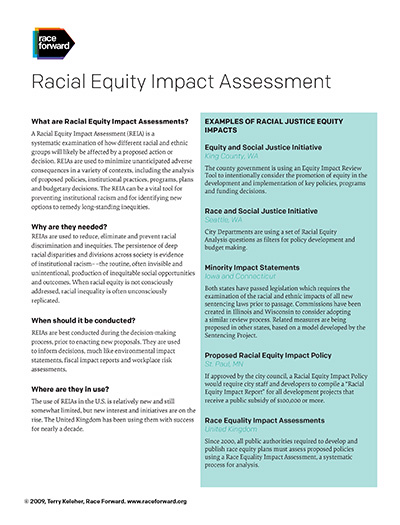Racial Equity Impact Assessment Toolkit

A Racial Equity Impact Assessment (REI) is a vital tool for analyzing how different racial and ethnic groups will likely be affected by a proposed action or decision. Use of an REI, such as this one, minimizes unanticipated adverse consequences in a variety of contexts, including the analysis of proposed policies, institutional practices, programs, plans and budgetary decisions. It also provides the opportunity to prevent institutional racism and identify new options to remedy long-standing inequities.
On November 6, 2013 Applied Research Center (ARC) was rebranded as Race Forward: The Center for Racial Justice Innovation. The content on this page was published on the ARC website prior to the rebrand.
What are Racial Equity impact assessments? A Racial Equity Impact Assessment (REIA) is a systematic examination of how different racial and ethnic groups will likely be affected by a proposed action or decision. REIAs are used to minimize unanticipated adverse consequences in a variety of contexts, including the analysis of proposed policies, institutional practices, programs, plans and budgetary decisions.
Why are they needed? REIAs are used to reduce, eliminate, and prevent racial discrimination and inequities. When racial equity is not consciously addressed, racial inequality is often unconsciously replicated.
When should they be conducted? REIAs are best conducted during the decision-making process, prior to enacting new proposals. They are used to inform decisions, much like environmental impact statements, fiscal impact reports and workplace risk assessments.
Where are they in use? The use of REIAs in the U.S. is relatively new and still somewhat limited, but new interest and initiatives are on the rise.
Race Forward’s Racial Equity Impact Assessment Toolkit can be a vital tool for preventing institutional racism and for identifying new options to remedy long-standing inequities.
